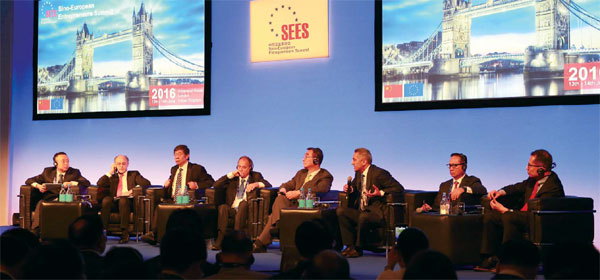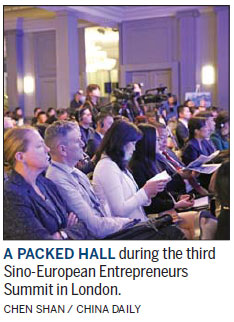Goals may need revision
Updated: 2016-06-17 08:29
By Angus McNeice(China Daily Europe)
|
|||||||||
The growing Chinese investment in European clubs comes under close scrutiny at entrepreneur summit
Chinese investors have launched a determined drive into European football, both at the club level and in the sport's infrastructure. Yet while many welcome the move, some have raised questions about their long-term intentions.
One of the biggest moves to date has been Shanghai Jinxin Investment Fund's acquisition of a 65 percent stake in MP & Silva, the No 1 football rights agency, in a deal that values the company at about $1 billion.
|
Experts discuss China and UK financial cooperation opportunities at the Sino-European Entrepreneurs Summit in London. [Photo by Chen Shan / China Daily] |
Representatives of Baofeng Technology and Everbright Group, the Chinese companies behind the fund, and MP & Silva came together in London on June 14 for a panel discussion on football investment during the two-day Sino-European Entrepreneurs Summit.
MP & Silva distributes sports programming to more than 200 broadcasters in 215 countries, with their products including English Premier League football and Formula One motor racing.
Previously, Chinese enterprises have either acquired football clubs outright, such as Aston Villa, or bought stakes in clubs, such as the deals struck with Inter Milan, Manchester City and Espanyol (and potentially AC Milan if talks with former Italian prime minister Silvio Berlusconi are successful). Companies have also agreed sponsorship deals with FIFA, world football's governing body.
There may be pitfalls, however.
According to Yang Muyue, founder of SBD International, a consultancy in Geneva that helps Chinese firms with European acquisitions, the Chinese are often in the danger of paying over the odds due to discrepancies between valuations in China and the West, and that this trend is also true in football industry acquisitions.
In China, valuations for resources tend to be at inflated prices, whereas in local markets, acquisition valuations are more reasonable, he explains. However, he adds, if Chinese companies can integrate football resources into their much larger home market operations to achieve greater synergy, the higher prices they pay will be worthwhile.
Wang Yunfan, CEO of Morning Whistle Group, which also helps with Chinese overseas mergers and acquisitions, urges Chinese investors to exercise caution when acquiring football assets.
"Post-merger integration is a challenge faced by all outbound Chinese acquisitions, but it becomes particularly significant in cultural industries such as football because companies in these industries have a high proportion of intangible assets compared with tangible assets," he says. "This means that if the Chinese managers cannot establish a good relationship with a Western football club's existing management and players, these talents may leave, and what the Chinese firm acquires becomes an empty shell."
Wang advises Chinese firms to first acquire minority stakes in Western companies, to get a taste of a club's culture and operations, and to gain a foothold at the boardroom level. Building this experience can reduce risk in post-merger integration, he says.
Giulio Gallazzi, chairman and CEO of consultancy NPV Europe, says when Chinese companies buy majority stakes in European football clubs, he advises them to set up a new board in charge of managing the target.
"It won't work keeping a club's existing management team because for a long time they've focused on the idea of running a football club in a European market and have no idea what the Chinese acquirer wants from the deal," he says.
MP & Silva co-founder Riccardo Silva dubbed his company's deal with Shanghai Jinxin the "perfect fit" in terms of finance and innovation, given Everbright's status as the second-largest financial group in China. He also cited Baofeng's progress in bringing virtual reality into broadcasting and its work to develop an internet TV platform.
Feng Xin, CEO of Baofeng Group, agrees that the partnership has come at the "perfect time", as China's GDP per capita continues to climb and an increasing number of people have money to spend on entertainment products.
Today's Top News
Germany, France, Italy urge Britain not to waste time in divorcing EU
Britain urged not to waste time in divorcing EU
Turkey's Erdogan apologizes to Putin
UK opposition leader Corbyn says will not resign
10 hurt in rollercoaster accident in central Scotland
Vote poses China-UK trade ties challenge
China respects Brexit decision
UK vote blows the whole European plan wide open
Hot Topics
Lunar probe , China growth forecasts, Emission rules get tougher, China seen through 'colored lens', International board,
Editor's Picks

|

|

|

|

|

|









